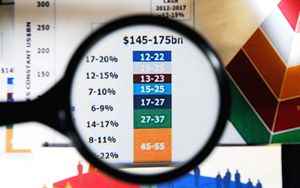(Finance) – The growth of the Eurozone has slowed down due to the effects of the war in Ukraine and the impact of inflation on household purchasing power and consumption. This is confirmed today by the forecasts for the third quarter formulated by a pool of independent economists consulted by the ECBwho revise their growth estimates downwards, adjusting those of inflation upwards.
The respondents have revised their inflation expectations upwards for all time horizons, indicating growth by 7.3% for 2022 from 6% previously indicated, a revision to 3.6% from 2.4% for 2023 and to 2.1% from 1.9% for 2024. According to the respondents, the upward revisions mainly reflect rising energy prices and food, but the stronger-than-expected increase in input costs. Longer-term inflation expectations to 2027 are averaged at 2.2%.
The real GDP growth expectations were instead downward magazines although experts note that the stronger-than-expected trend in the first quarter of 2022 has largely offset the weaker trend expected in the other quarters. GDP is shown to be growing up 2.8% this year from 2.9% previously reportedwhile the revision is more marked for 2023 at 1.5% from 2.3%, Confirmed the growth for 2024 at 1.8%.
These darker forecasts include the escalation of pressures on energy pricesthe tightening of the monetary policy around the world and the effect of inflation on purchasing power of families. And although the supply chain bottlenecks linked to the COVID-19 crisis have eased somewhat, they are believed to still act as a drag on the global economy. Positive effects instead they are derived from fiscal measures against rising energy prices and the effects of post-Covid reopeningespecially on the tourism and transport sector.
Parallel to the downward revision of growth, the expectations on the unemployment rate have worsened again and the unemployment rate is expected to drop from 6.7% in 2022 to 6.4% by 2027. Long-term unemployment expectations are at the lowest level in the history of the survey launched in 1999.
